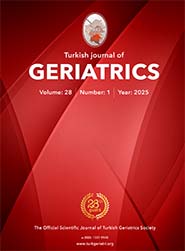2Nisantasi University, Health Services Vocational School, Ä°stanbul, Turkey
3Istanbul Aydin University, Faculty of Health Sciences, Ä°stanbul, Turkey DOI : 10.29400/tjgeri.2025.425 Introduction: Our study examined age-related changes in the musical perception skills of musicians and non-musicians.
Materials and Method: This study included two groups. The first group consisted of 40 individuals, including 20 musicians aged 45-64 and 20 musicians aged 65-85. The second group also consisted of 40 individuals, including 20 non-musicians aged 45-64 and 20 non-musicians aged 65-85. Together, both groups comprised 80 adults. Participants" musical perception skills were evaluated using the Musical Perception Test.
Results: The results showed that musicians had higher scores than nonmusicians on the Musical Perception Test total score and all music subtests (p<0.05). In addition, when age-related changes were examined, musicians between the ages of 45-64 had significantly higher scores than musicians between the ages of 65-85 on multiple instrument recognition, total instrument score, pitch discrimination, total pitch, and total Musical Perception Test scores (p<0.05). Similarly, non-musicians aged 45-64 had significantly higher scores than non-musicians aged 65-85 in rhythm recognition, single instrument recognition, total instrument score, musicality, melody recognition, melody recognition in noise, total melody score, and total Musical Perception Test score (p<0.05). In the 45-64 age group, there was a significant difference between musicians and non-musicians on all sub-scores except that for rhythm recognition (p<0.05). In the 65-85 age group, there was a significant difference between musicians and non-musicians on all scores except pitch recognition, pitch discrimination, and the total pitch score (p<0.05).
Conclusion: The results suggest that music education preserves auditory and musical perception skills despite advancing age.
Keywords : Aging; Music; Perception
